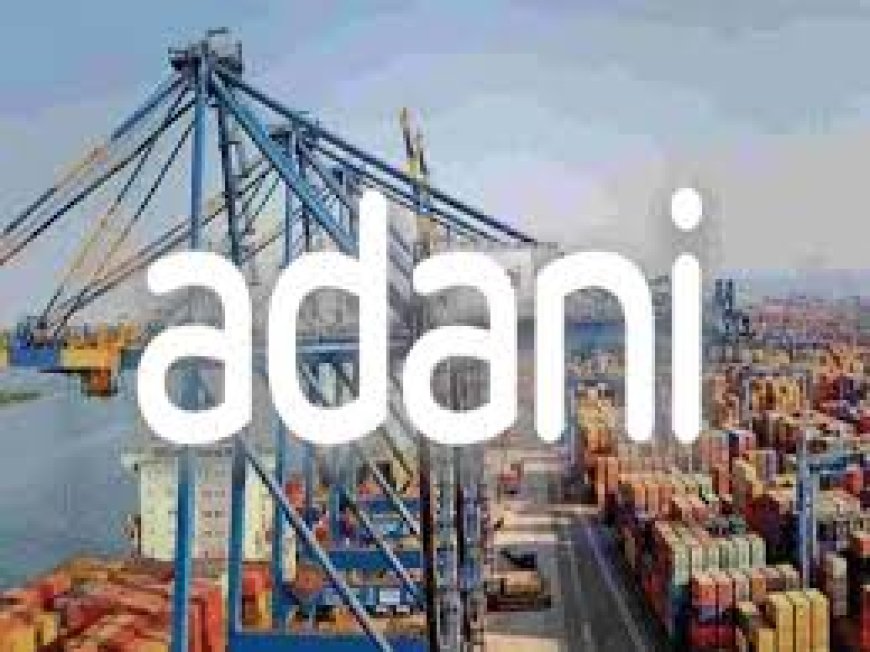Adani Ports shares drop 2%, extend losses for 6th session amid Israel-Iran conflict
Adani Ports shares decline for the sixth consecutive session, falling 2% amid Israel-Iran tensions. Analysts cite geopolitical concerns and global trade route disruptions.

Mumbai, June 18, 2025 — Shares of Adani Ports and Special Economic Zone Ltd (NSE: ADANIPORTS) fell by nearly 2% in Tuesday’s trade, continuing a downward streak that has stretched to six consecutive sessions. The persistent decline in stock value, now totaling over 7% in one week, is largely attributed to escalating tensions in the Middle East—especially between Israel and Iran—which have heightened fears over trade route disruptions and global shipping volatility.
Geopolitical Jitters Amplify Risk for Maritime Trade Stocks
The Israel-Iran conflict, intensifying since early June, has sparked widespread concerns over the security of key global maritime routes, particularly those linked with the Persian Gulf and Red Sea regions. For Adani Ports—a company heavily dependent on global trade flows and maritime stability—the geopolitical instability acts as a direct overhang.
"Shipping and logistics companies are among the first to feel the ripple effects of geopolitical turbulence," said Anand Batra, Senior Analyst at Kotak Institutional Equities. "Adani Ports, with its strong international linkages, is understandably seeing increased pressure as the Israel-Iran conflict raises risks of disruptions to oil and cargo movement in the Arabian Sea."
Volume Spike Indicates Bearish Mood
Tuesday’s session on the NSE witnessed above-average trading volumes in Adani Ports shares, signaling broad-based institutional selling. The stock closed at ₹1,182.35, down 2% from the previous close of ₹1,205.85. The technical charts indicate a strong bearish sentiment, with the stock now hovering below its 50-day moving average, a key technical indicator for medium-term momentum.
“Adani Ports has breached multiple support levels recently,” said Rajesh Rathi, Technical Strategist at Angel One. “If the stock breaks below ₹1,150, the next support lies at ₹1,120. Resistance remains firm at ₹1,225.”
Impact Beyond Geopolitics: Broader Market & Sectoral Weakness
While the geopolitical narrative dominates, other contributing factors include broader market volatility, profit booking, and lingering concerns around valuation premiums in Adani Group companies.
The Nifty 50 closed flat with a slight positive bias, but the Nifty Infrastructure index underperformed, shedding 0.6%, led by losses in Adani Ports, GMR Airports, and Container Corporation of India.
The recent pullback comes amid otherwise strong fundamentals. Adani Ports reported a 29% YoY rise in consolidated net profit at ₹2,036 crore for Q4FY25 and handled a record 420 MMT of cargo in FY25, up 18% YoY. Still, these strong numbers have failed to arrest the slide in the short term.
Investor Caution Prevails Amid Uncertainty
Despite healthy financials, many institutional investors are exercising caution. Foreign institutional investors (FIIs), in particular, have trimmed their positions in emerging market port stocks, including Adani Ports, fearing global trade disruption and crude price volatility due to the Middle East situation.
"Until the Israel-Iran situation cools off, trade-related equities, especially those linked with seaborne logistics, will remain vulnerable," said Priya Ramesh, Global Macro Strategist at HSBC India. "Investors are waiting for clarity on how the conflict evolves before re-entering with conviction."
Outlook: Wait and Watch Approach
Most analysts maintain a neutral to cautious outlook on the stock in the near term, despite long-term structural strengths. The ongoing correction is seen as a geopolitical risk-led retracement, not a reflection of core business weaknesses.
Brokerage ICICI Securities retains a ‘Buy’ rating on the stock, citing attractive long-term growth potential, diversified port assets, and robust operational performance. However, the firm has also issued a volatility warning due to geopolitical instability.
For long-term investors, the current dip could offer accumulation opportunities, but only with a clear risk management strategy in place.
Navigating the Storm
The extended decline in Adani Ports’ share price underscores the broader market anxieties triggered by global conflicts. While the company’s business fundamentals remain intact, external shocks such as regional wars can temporarily derail even the strongest of market performers.
Until a diplomatic breakthrough or a decline in hostilities occurs, the stock is likely to remain range-bound, with headline risk being the dominant force in the short term.
What's Your Reaction?
 Like
0
Like
0
 Dislike
0
Dislike
0
 Love
0
Love
0
 Funny
0
Funny
0
 Angry
0
Angry
0
 Sad
0
Sad
0
 Wow
0
Wow
0












































































